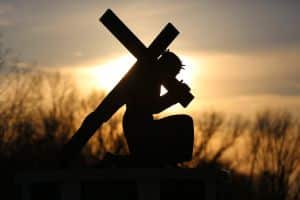
Our consumer culture spills over into our practice of faith. Some engage in the habit of “church shopping.” We look for a Church where we can feel “comfortable” and where the services are more “stimulating”. And when the “cool” Church that we attend loses its appeal, we do the comfortable thing and quit going to Church altogether.
Contrast this with the early Church as experienced in the life of St. Paul. While establishing the Church in Lystra, he met up with opposition (Acts 14:19-28).
“In those days, some Jews from Antioch and Iconium arrived and won over the crowds. They stoned Paul and dragged him out of the city, supposing that he was dead. But when the disciples gathered around him, he got up and entered the city. On the following day he left with Barnabas for Derbe.”
Though he was almost beaten to death, Paul got up the “next day!” and headed out for another “round” of struggle. He visited some of the churches he had previously established to give them encouragement.
“They (Paul and Barnabas) strengthened the spirits of the disciples and exhorted them to persevere in the faith, saying, ‘It is necessary for us to undergo many hardships to enter the Kingdom of God.’”
No doubt these infant communities were undergoing trial–probably in the form of persecution. Paul, in effect, said “that’s good; it is part of following Christ.” He even went so far as to say it is “necessary” to undergo, not just a few, but “many” hardships to make it into the Kingdom of God. Paul was not talking theory; remember he had just come from being stoned almost to death. I’m sure he still bore the bruises and gashes in his body from the Lystra experience.
Today we celebrate the feast day of St. Christopher Magallanes and Companions. This heroic and productive priest did great work for God in the country of Mexico. He worked among the poor and founded schools for them. In the 1920’s an anti-Catholic government took over and closed the seminaries. Christopher fought back and tried to re-open the seminaries. This resulted in his martyrdom—along with twenty-one diocesan priest and three laymen. Were these men looking for a safe and comfortable faith experience? They, like Paul, underwent great hardships, not just for themselves, but for the entire Church of Mexico.
Jesus in his Last Supper discourse spoke of his own hardships (John 14:27-31).
“I will no longer speak much with you, for the ruler of the world is coming. He has no power over me, but the world must know that I love the Father and that I do just as the Father commanded me.”
Out of love for his Father, Jesus was about ready to let Satan have his way. Considering the suffering he endured, there remains no doubt of how much Jesus loved his Father. By freely enduring hardships, he witnessed to the world how deeply he desired to do the Father’s will.
How do we handle the necessary hardships God puts in our path so we can enter his Kingdom? Do I find myself complaining of having to kneel too long at Mass, or of the priest talking too long? Do I find myself avoiding doing God’s work because of the sacrifice, inconvenience, and possible peer rejection that it entails? Let us resolve to embrace the hardships that come our way as we set out to do the work God has assigned us.
“Christ had to suffer, and to rise from the dead, and so enter into his glory” (Luke 24:46).
